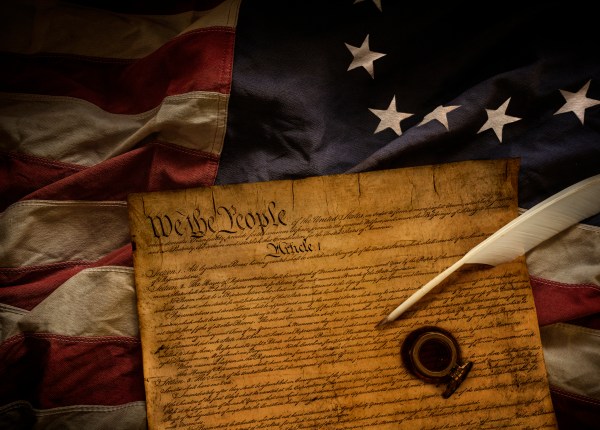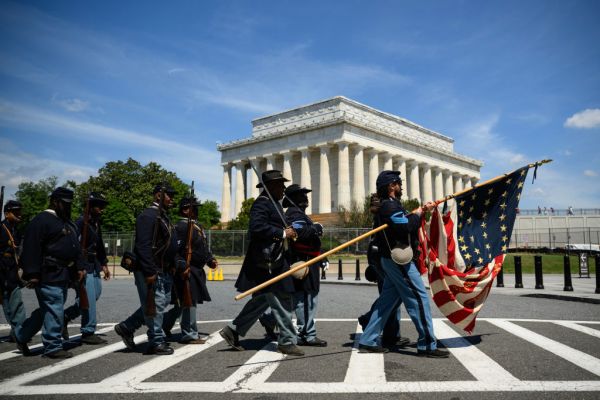Apologists for American slavery often employ relativistic arguments: Legal slavery was part of human society from its earliest days and persisted in the world for decades after it was abolished here. In some places, it persists even today.
These things are true, and historical context is important. We can’t hold people of the past to modern standards. But we can hold them to their own.
The very absence of the words “slave” or “slavery” from the Constitution speaks to the shame the framers felt. We can grant reality—that the politics of the time meant the debate in Philadelphia in 1787 wasn’t whether the Constitution would permit slavery or not, but rather whether we would have a Constitution or not—but we can’t pretend that it was undertaken without knowledge of the evils involved.
It was an ugly calculation, and it required three key compromises in the document: Anti-slavery delegates agreed to allow 20 years before banning the international slave trade, which was already odious in much of Western society; Southern delegates agreed to get credit for only three-fifths of their enslaved people in determining congressional representation and Electoral College votes; and, most barbarously, the convention accepted South Carolina’s demand for a clause relating to fugitive slaves.
“No Person held to Service or Labour in one State … escaping into another, shall … be discharged from such Service or Labour,” reads Article IV, Section 2, Clause 3, “but shall be delivered up on Claim of the Party to whom such Service or Labour may be due.”
Two words in that passage reveal the evil of that clause: “Person” and “escaping.”
James Madison, who knew at the time that it was “wrong to admit in the Constitution the idea that there could be property in men,” and others who understood the blight slavery represented on our founding ideals accepted a union in which officials in free states would be obliged to take innocent men, women, and children who had found freedom back to bondage.
Others can debate the alternate timelines and what would have happened in and to the disunited states of America—about slavery, about freedom, about self-determination—or for peace and liberty for all humankind in the past 236 years without the United States of America. But the members of the founding generation, those who had sacrificed so much for independence, chose a nation with slavery rather than no nation at all. They did not create a nation to preserve slavery, but they preserved slavery to create a nation.
In his second inaugural, Abraham Lincoln spoke to this bargain, describing American slavery as “one of those offenses which in the providence of God must need come, but which having continued through His appointed time, He now wills to remove.” The horrors of the Civil War were visited upon “both North and South” as “the woe due to those by whom the offense came.”
The Founders’ bargain had deferred the costs of tolerating such an evil, but the debt would be paid by their heirs—in slave states and in free ones—“until every drop of blood drawn with the lash shall be paid by another drawn with the sword.”
About as many Americans died in the Civil War as in the Revolutionary War, the War of 1812, World War I, World War II, the Korean War, and the Vietnam War, combined. Some 620,000 soldiers paid the ultimate price for the establishment and preservation of legal slavery in the United States. Similar losses for our current population would be close to 6 million men.
Those deaths should not in any way obscure the horrors inflicted on millions of innocents through 250 years of legal slavery. Nor do they compensate for the descendants of slaves who suffered for generations in the aftermath of emancipation and the establishment of laws of deliberate oppression.
But they do constitute a blood sacrifice at the altar of liberty.
Today, 28 states—but not South Carolina—will officially observe the federal Juneteenth holiday instituted in 2021. The event is rightly understood as a celebration of the end of slavery, the anniversary of the day 158 years ago when federal troops arriving in Galveston, Texas, informed the black Americans there that they were free people.
This is indeed a good cause for celebration—of the endurance of the victims of slavery and the victory in the war that ended it. But it should be a moment for us all to remember the price that was paid for the offenses of our founding and the cost of factionalism in a republic.
So much has been lost to make and keep us free and united. Pray that we can muster the gratitude to keep it that way.









Please note that we at The Dispatch hold ourselves, our work, and our commenters to a higher standard than other places on the internet. We welcome comments that foster genuine debate or discussion—including comments critical of us or our work—but responses that include ad hominem attacks on fellow Dispatch members or are intended to stoke fear and anger may be moderated.